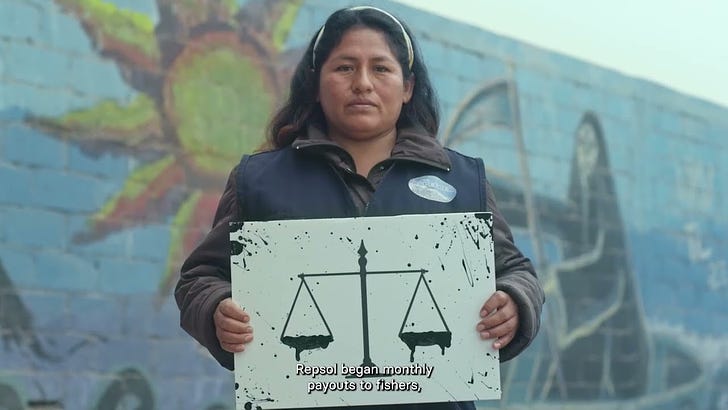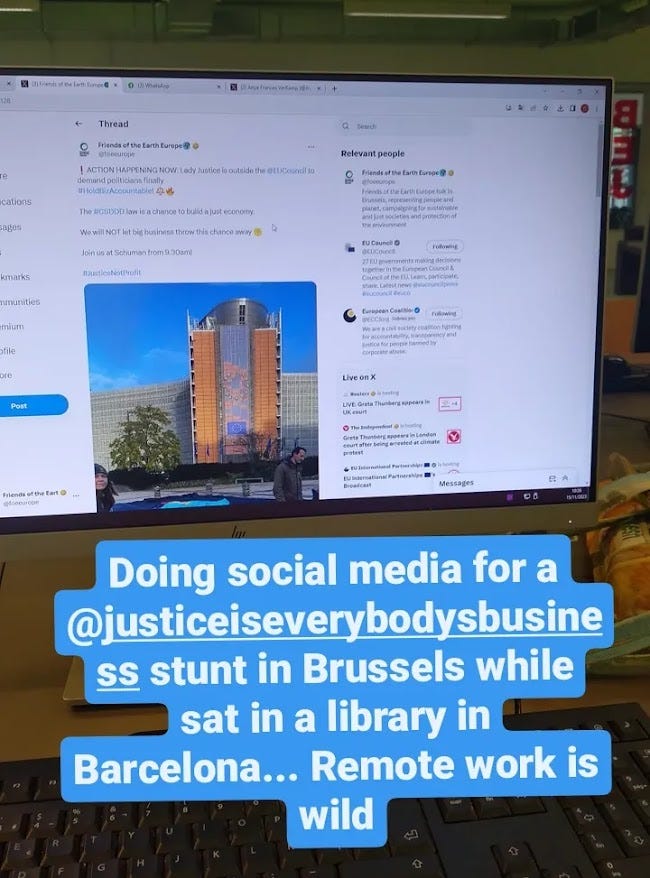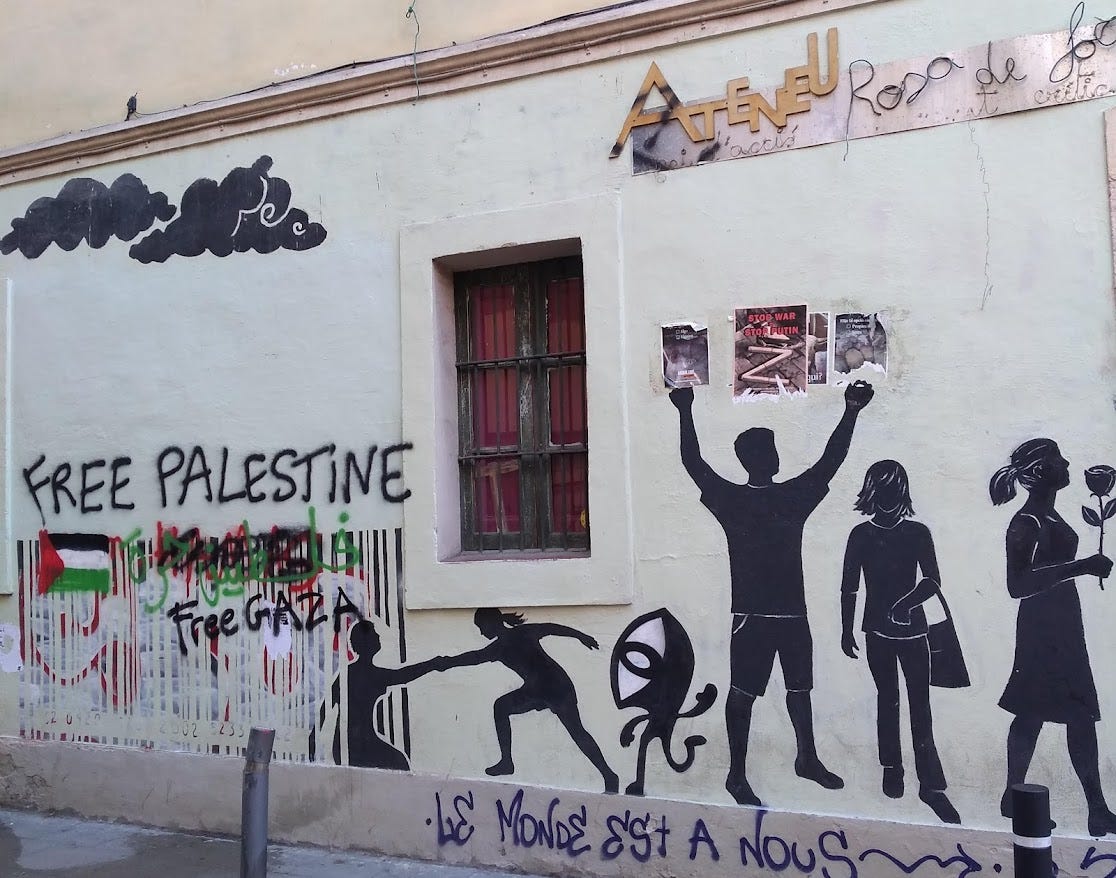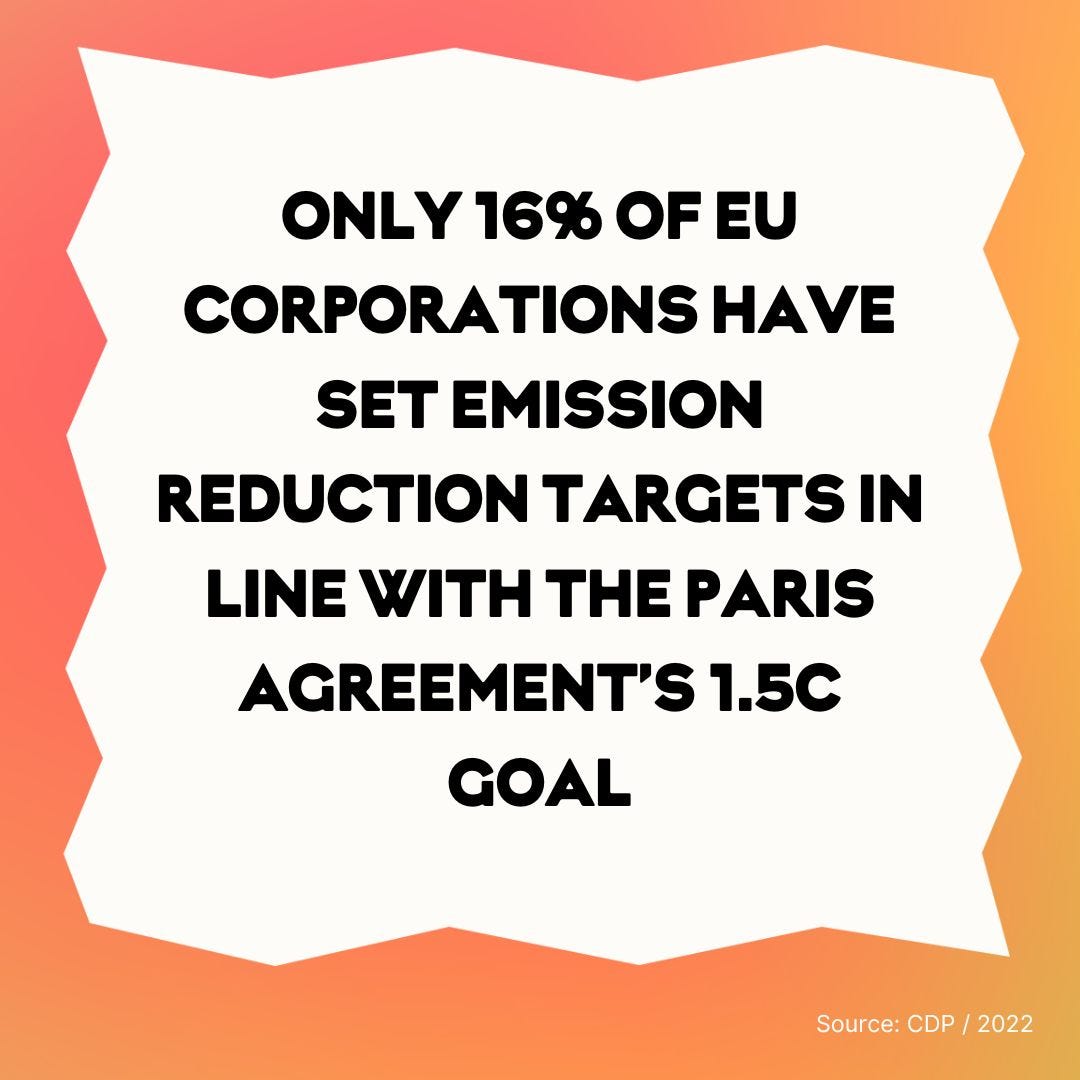The EU is lowkey planning to let banks invest in the climate crisis. Let's stop them.
Also, a rant for everyone who's ever felt like they don't belong in a new country.
The help desk lady looks at me patiently. The look of someone about to explain something simple for the fifteenth time to a child.
“The thing is, we can only give library cards to Barcelona residents.” she says.
“OK- look I am a resident, just temporarily-” (It’s kind of true). “I just really need to use the computer. Mine got stolen.”
Typing. “Your passport has two surnames.”
“Yes.”
“But your ID has one.”
“Yes, well that’s because the Spanish passport system sort of required two so I-”
¿Pero, De dónde eres? Where are you from? Belgium?”
“Bueno yes, but no - I’m Spanish, well, British I - vale, yes I’ll wait.”
A pause. A sigh that says You are a problem.
I think of all the emails stacking up in my inbox. After this, the same process at the doctor. Then the post office. Phone number too foreign. Not enough surnames for the Spanish system, too many for the Belgian one. Now it’s a problem they don’t match. Need a passport. Need ID for a passport. If the computer can’t process me, I don’t exist.
I’m tired. I want to go home.
Don’t know what I mean by that exactly. See, I’m half Catalan, fun fact. So shouldn’t I be half-home here in Barcelona? But no. British accent, British surname, and worse - forgetting words in the language I was brought up in! Using Spanish words instead, the imperialist language, the shame - I reveal my hand. Jo no soc d’aquí.
Just another Digital Nomad here to take up space in your cafes with my laptop and then leave with my passport privilege and shiny highlights reel. #Travelgram.
It’s not true but it feels true. I talked before about the chaos of being in your mid-20s in the mid-20s. We move countries, move cities, move mountains to pursue careers, escape dead-end jobs, build relationships, chase ideals. It’s great, it’s trendy, it’s awful, it’s gentrifying every capital city, being from everywhere, belonging nowhere.
But right now, I want to go home. Ik ben zo moe. Some graffiti in Barcelona says Go home. Great, would you give me directions? I don’t know where that is. Some place where everyone is the same weird British-Catalan-Belgian hybrid mix as me. Qué aburrido.
I don’t know if home is a place at all. Maybe I like the idea of going home just to be going somewhere. I never stop. If I ever made it to Ithaca I’d probably just leave again. In pursuit of the belief the grass is greener on some other path, in some other place, some other way of being.
The grass must be green somewhere, n’est-ce pas? - because here the earth is scorched by drought, and I have to believe it’s just that I’m looking in the wrong places.
Home is an idea I have in my head. Somewhere nobody has to justify their existence. I don’t fit into the boxes on your forms and nor do most of you. God and I’m one of the the luckiest people in the world, escaping Brexit with my shiny EU passport. Is this really as good as it gets?
We’re navigating a time that is set to send thousands, millions more of us away from where we grew up. Squeezed labour markets, geopolitical conflict, climate disasters and the universal desire to build a future worth giving our children - those public library computer systems better be ready for more citizens of nowhere.
I chose to come to Barcelona. This country doesn’t owe me anything. But many of us don’t choose where we have to move. Globalisation is creating new and increasingly complex identities and paths, in a system that doesn’t know how to process such diversity.
It’s not your fault to feel like you don’t belong. In unstable worlds, we can create new systems, new identities, new homes. People are afraid of the unknown. I’m more afraid of the old.
Home is a future place. Maybe we will not ever fully know if we got there. But it’s the going that matters, it’s the trying. Belonging is a continuous verb. Seguim endevant [keep going].
What’s Going On?
Current ‘carbon bomb’ projects set to blow through 1.5 degree target twice over.
Related: Governments plan to produce double the fossil fuels in 2030 than the 1.5°C warming limit allows.In Palestine and Israel, de-escalating conflict through environmental action.
Related: What’s the Israel-Palestine conflict about? A simple guide.Fossil fuel interests have large, yet often murky, presence at climate talks, AP analysis finds.
Related: COP28 host UAE to extract nearly 40 billion barrels of oil and gas over 70 years.Deforestation in Colombia down 70% so far this year.
Related: Deforestation in Brazil's Amazon falls to lowest since 2018.‘It’s not viable any more’: global heating sparks first climate class action by Indigenous Australians.
Related: Australia signs security, migration pact with Pacific's Tuvalu.BP and Spotify bought carbon credits at risk of link to forced Uyghur labour in China.
Related: China’s use of forced Uyghur labour is suppling the UK seafood industry.
If you’d like to support The Green Fix, please consider tipping us a virtual coffee.
Focus On… Economic Justice
This week activists brought a giant statue of stabbed Lady Justice to the Council of the EU - here's why.
On Wednesday 15 November, a group of activists and NGOS brought a giant statue of Lady Justice being stabbed in the back to the Schuman roundabout in Brussels.
The stunt coincides with EU negotiations on a law designed to safeguard human rights and the environment from corporate activities, and hold companies accountable when harm occurs in their value chains.
This law is called the Corporate Sustainability Due Diligence Directive (CSDDD).
“We are here today with one demand: that national representatives support a strong law to defend human rights and the environment from private interests. A corporate accountability law with loopholes for further injustice is like a book with the last page ripped out - it doesn’t make sense. That means clear access to justice for victims, and an obligation for companies to publish and implement a climate transition plan and sanctions if they fail to do so.”
Alban Grosdidier, Climate Campaigner at Friends of the Earth Europe, said:
After years of negotiations, the directive is in the final stages of the EU political process.
However, the existing draft law has loopholes and the Council risks passing even more. Currently the law lacks strong requirements for companies to develop detailed transition plans, and a leak revealed that the Spanish Presidency is proposing to remove mentions of the Paris Agreement and other major environmental provisions from the draft text, at the request of influential EU member states.
Exclusion of the Paris Agreement would mean that due diligence obligations would not cover companies’ impact on the climate and would make it harder for citizens or victims of corporate harm to take high polluting companies to court for their role in contributing to climate change.
The ongoing EU trilogue, involving the European Commission, EU Council, and European Parliament, is at a 'make or break' moment for the CSDDD.
The current text proposes that companies are legally obliged to identify and mitigate any potential harms to the environment and human rights along their supply chains. It also provides several measures for victims of harm to seek justice when harm does occur.
Despite EU commitments to climate goals, the involvement of EU market companies in high-impact fossil fuel projects means it's not clear whether this law will work or just turn into another greenwashing exercise.
Now the EU Council needs to finalise the negotiations with Member States before the end of the year. The next round of negotiations is set to take place on 22 November in Strasbourg.
Why do we need companies to be legally accountable for their climate impact?
Fossil fuel companies are still recklessly planning mega projects like the East African Crude Oil Pipeline or the Mozambique LNG projects. Agribusiness is sourcing products like meat from farms on thousands of hectares of deforested land in the Amazon, and pumping billions of gallons of methane into the atmosphere through animal farming. The global fashion industry produces up to 10% of global carbon emissions.
The recent Carbon Bombs report by CAN Europe and Friends of the Earth Europe revealed that there are currently 425 ‘carbon bomb’ projects globally. A “carbon bomb” refers to a fossil fuel extraction project set to generate over one gigatonne of CO₂ throughout its remaining lifetime.
107 of them are either operated or financed by European companies, featuring well-known names like Total Energies, Shell, RWE, and ENI, with support from major European banks.
“[The report is] about the involvement of European companies in the world's biggest fossil fuel extraction projects, and sets out the case for or legally binding climate reduction targets for companies and their enablers, the EU’s financial sector, in the EU due diligence law,” Audrey Changoe, Trade and Investment Policy Coordinator at CAN Europe, tells us. “Indigenous communities often bear the brunt of these extractions, notably visible in cases such as Vaca Muerta Shale in Argentina, a Carbon Bomb.”
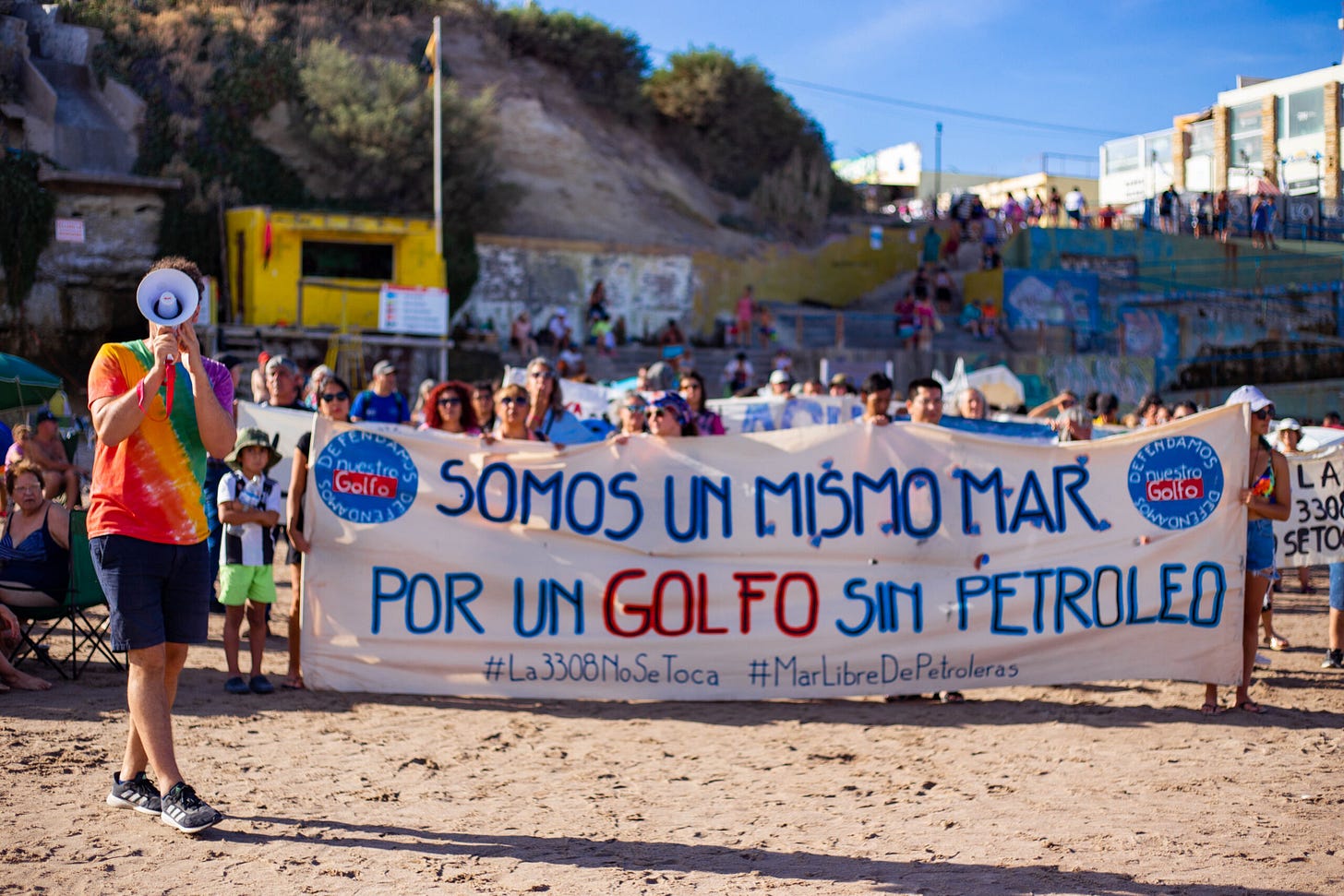
To put this into perspective, this emission scale would be nine times the global total witnessed in 2021 and 17 times beyond the limit on emissions for the EU to achieve its 2030 target.
“The number and intensity of these gigantic fossil fuel projects is shocking and shows that existing voluntary corporate commitments are insufficient. Fossil fuel companies are deceiving the public with their greenwashed strategies, while they keep making record profits on climate breakdown. Their destructive business model must be put to an end [or] a harrowing worst-case scenario continues, where social and environmental catastrophes go unchecked, particularly at the costs of the Global South."
Audrey Changoe
The CSDDD presents a historic chance to defuse these gigantic fossil fuel expansion projects and to transform the way fossil fuel corporations conduct business. It marks a crucial step against corporate misconduct and could fit into a larger legislative framework aiming to reach the EU's 2050 climate neutrality goal and align with the Paris Agreement’s 1.5°C target.
What can people do?
Sign the call by Justice is Everybody’s Business and demand your minister to deliver a corporate justice law.
Not in the EU? We still need your support. A law of this scale can change the playing field for holding corporations accountable around the world.
Read more:
Framework Principles on Human Rights and the Environment (2018)
Fuel to the fire: EU banks and investors tied to violence in South Sudan (NOV. 14, 2023)
Follow the Justice is Everybody’s Business campaign on Instagram @justiceiseverybodysbusiness or through the hashtag #HoldBizAccountable.
So Now What Do I Do?
LEARN
Read: No matter your job, here’s 3 evidence-based ways anyone can have a real impact.
We’re on a podcast! Listen to Editor Cass Hebron’s conversation with the VONA podcast on what ‘perfect activist’ really means.
Watch: How to safeguard against misinformation and disinformation at COP28.
TRY SOMETHING NEW
Tune into this free webinar on ‘leadership in a changing and complex world’ by Unity Effect on 20 November at 16 CET.
Spark a Change activist training is open for applications! Apply by 26 November.
The Changemakers for Democracy Fellowship is open for applications from EU residents until the 5th December.
TAKE ACTION
Join the #StopRosebank welcome rally to find out how you can stop oil and gas projects in the UK & worldwide. 21 November.
Join the webinar ‘COP28 and The Fight for Climate Justice’ by the Climate Justice Coalition and War on Want on 21 November online.
Applications are now open for the UN Millennium Fellowship for students worldwide until end of January.
By the way…
The Green Fix is now offering low-cost sponsored slots on the newsletter. Book your slot by emailing wearethegreenfix@gmail.com.
Stay in the loop
You can follow the Green Fix on Twitter @TheGreenFix, Instagram @thegreenfix_ and LinkedIn. You can also connect with Cass Hebron (Editor) on Instagram @coffee_and_casstaways, Twitter @casstaways and LinkedIn Cass J Hebron.


